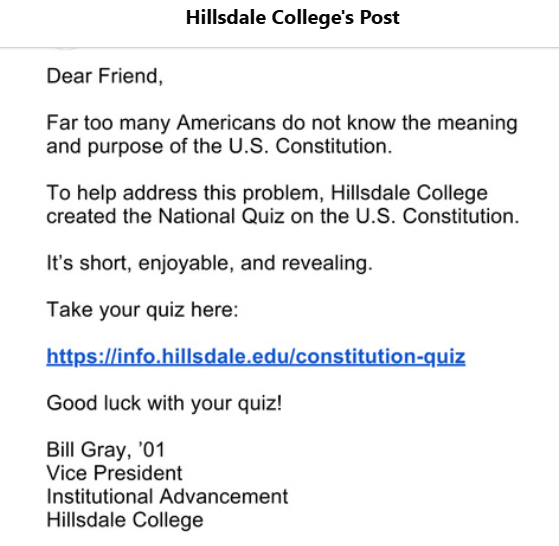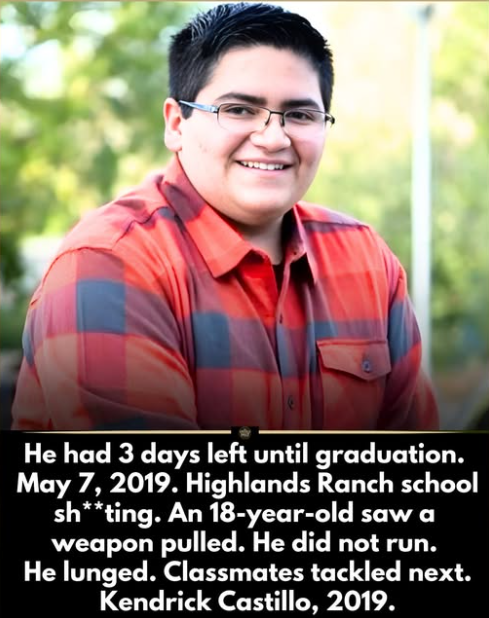 As one might expect, a great deal has changed about the way we warn about the danger of wildfires. First is the word “wildfires” itself, which, up until the last couple of decades, were called “forest fires.”
As one might expect, a great deal has changed about the way we warn about the danger of wildfires. First is the word “wildfires” itself, which, up until the last couple of decades, were called “forest fires.”
Second is the Smokey the Bear icon, and his famous phrase, “Only you can prevent forest fires.” Smokey is no longer used in today’s PSAs on the subject.
Above, we see that some clever person has morphed this to address what is virtually certain to happen on the planet if we’re unable or unwilling to mitigate climate change.
Renewable Energy
Understanding the U.S. Constitution
 Hillsdale College is a rightwing Christian extremist organization that ostensibly honors the United States Constitution.
Hillsdale College is a rightwing Christian extremist organization that ostensibly honors the United States Constitution.
Here’s their quiz, which should be called the “Constitutional Trivia Quiz.”, whose purpose is obviously to convince Americans of their ignorance.
When I teach, I’m going for understanding of the topic, not the memorization of useless information.
Renewable Energy
Bravery Meets Tragedy: An Unending Story
 Here’s a story:
Here’s a story:
He had 3 days left until graduation.
Kendrick Castillo was 18. A robotics student. College bound. Accepted into an engineering program. The final week of school felt like countdown, not crisis.
Then a weapon appeared inside a classroom.
Students froze.
Kendrick did not.
Witnesses say he moved instantly. He lunged toward the attacker. No hesitation. No calculation.
Two other students followed his lead.
Gunfire erupted.
Kendrick was fatally sh*t.
But his movement changed the room.
Classmates were able to tackle and restrain the attacker until authorities arrived. Investigators later stated that the confrontation disrupted the attack and likely prevented additional casualties.
In seconds, an 18-year-old made a decision most adults pray they never face.
Afterward, the silence was heavier than the noise.
At graduation, his name was called.
His diploma was awarded posthumously. The arena stood in collective applause. An empty seat. A cap and gown without the student inside it.
His robotics teammates remembered him as curious. Competitive. Kind. Someone who solved problems instead of avoiding them.
He had planned to build machines.
Instead, he built a moment.
A moment that classmates say gave them time.
Time to escape.
Two points:
If you can read this without tears welling up in your eyes, you’re a far more stoic person than I.
Since Big Money has made it impossible for the United States to implement the same common-sense gun laws that exist in the rest of the planet, this story will reduplicate itself into perpetuity.
Renewable Energy
Forced Transgendering of America’s Little Kids
 How often does this happen? How about never?
How often does this happen? How about never?
Trump loves to say that little boys go to school and come back home little girls.
He’s the most powerful person in the world for exactly one reason: We’re a nation of morons.
-
Greenhouse Gases7 months ago
Guest post: Why China is still building new coal – and when it might stop
-
Climate Change7 months ago
Guest post: Why China is still building new coal – and when it might stop
-

 Greenhouse Gases2 years ago
Greenhouse Gases2 years ago嘉宾来稿:满足中国增长的用电需求 光伏加储能“比新建煤电更实惠”
-
Climate Change2 years ago
Bill Discounting Climate Change in Florida’s Energy Policy Awaits DeSantis’ Approval
-
Climate Change2 years ago
Spanish-language misinformation on renewable energy spreads online, report shows
-

 Climate Change2 years ago
Climate Change2 years ago嘉宾来稿:满足中国增长的用电需求 光伏加储能“比新建煤电更实惠”
-
Climate Change Videos2 years ago
The toxic gas flares fuelling Nigeria’s climate change – BBC News
-

 Carbon Footprint2 years ago
Carbon Footprint2 years agoUS SEC’s Climate Disclosure Rules Spur Renewed Interest in Carbon Credits






